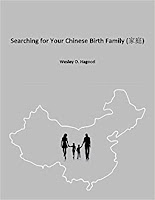It was only a matter of time before someone put pen to paper to offer a guide to Chinese adoptees as to how to search for birth families in China, and Wesley Hagood shows through his presentation that he is up to the task. Having known Wes since 2004 when he requested his daughter’s finding ad from us, I have always been impressed by his doggedness and attention to the smallest of details. Both of these characteristics are on full display in this book.
“Searchingfor Your Chinese Birth Family” is divided into nine chapters and
appendixes covering the full range of how a search could be conducted,
including chapters on using DNA, hiring searchers to search using the orphanage
documentation, and searching using social media inside China. He wisely recommends that searching
adoptees begin with a genetic genealogy-based (DNA) search because it is easy,
inexpensive, and over time has the greatest probability of success (Wes speaks
here from experience. After employing hundreds, if not thousands of hours
implementing other methods of searching, the match to his daughter was
ultimately made by a simple DNA test). Wes
employs a very broad “adoptee-centered” searching approach, meaning that he
offers any and all ideas for a single adoptee to
utilize, giving little emphasis to effectiveness and value of the various
search ideas, nor for the potential impact of those ideas on the community at
large. Other than small lists prioritized by what he feels is the order things
should be done in, he offers no opinion as to whether an adoptee should employ
particular search avenues, or whether these ideas will have a chance of
success. In other words, there is very little data behind the ideas.
To
use one small example: On the list of potential DNA data bases that an adoptee
could utilize he references Zuyuan, a company that briefly came on the scene in
2018 concurrent with Wes writing this book. Zuyuan’s claim to fame was that
they were able to match a pre-identified birth family with a pre-identified
adoptee using a third-party DNA company. When word spread of this reunion, the
adoption community was excited, and people started thinking that this could be
a viable path for reunions. It was this excitement that allowed Wes to include
Zuyuan on his list of Chinese data bases.
The
problem was that as adoptees uploaded their DNA to Zuyuan, Zuyuan then turned
around and marketed their DNA to birth families to encourage them to test with
Zuyuan, for a fee. Some of these birth families, a few of whom we have met, felt that since they had done a DNA test with Zuyuan that they would not need to test further to
get into other, more reliable and far-reaching data bases. Thus, in a very real
sense, birth families that tested with Zuyuan (and it probably wasn’t many
before the company shut down a short time later) were potentially deprived of
any chance of locating their relinquished child. Their DNA may be lost to the
adoption search community (Wes did include a footnote to our article strongly
discouraging the use of Zuyuan).
The
primary issue I see with Wes’s book is that by approaching the subject from an
"adoptee-centered" perspective, Wes ignores the overall search
community, and how individual steps taken can positively or negatively impact the larger search efforts
of all. He fails to point out that not only should adoptees search for
themselves, but they should be mindful of how their actions will impact those
that follow after. Yes, an adoptee should do everything in their power to
search, but only if those actions don’t hurt the chances of others. Those that
pushed for Zuyuan, for example, unwittingly damaged the search efforts of the
entire community. I would have liked to see more “broad picture” discussion in
Wes’s book of the various data bases and other strategies he wrote about. Such
a “data driven” appraisal to go alongside his recommendations would have
greatly increased the value of the book.
The
book is extremely valuable for presenting the huge pile of bricks from which an
adoptee can pick and choose to form their search "platform." Most
will not use all of the ideas, because as Wes points out each adoptee’s story
is unique. Wes correctly emphasizes that before an adoptee does anything, they
should gain the information about their particular orphanage. Understanding
what was happening in an adoptee’s orphanage is crucial to building a search “platform”
on a solid foundation.
Wes’s
final chapter, “Our Story – Xinyi Under My Skin,” is a tremendously informative
and enjoyable chapter. It should really be read first. It is here that we see
the doggedness and determination of the author on full display. I was left
wanting more at the end of the chapter. He confirms, for example, that the
Xinyi orphanage had a baby-buying program in place, something we confirmed in
2019 when we matched an adoptee from Xinyi with her birth family in Wuchuan.
But Wes deprives us from knowing what he learned about how his daughter came to
be in the orphanage. The revelation of these reunions is important, I believe,
to allow later adoptees to know what their story may have been. (In private
correspondence Wes relates that the birth family has no idea how their daughter
ended up in the orphanage, which information also informs other searching
adoptees).
Wes
has compiled an impressive book on searching. I would encourage searching
adoptees and their families to use “Searching for Your Chinese Birth Family” as
a springboard for researching their own search strategies. It is a valuable
resource.

No comments:
Post a Comment